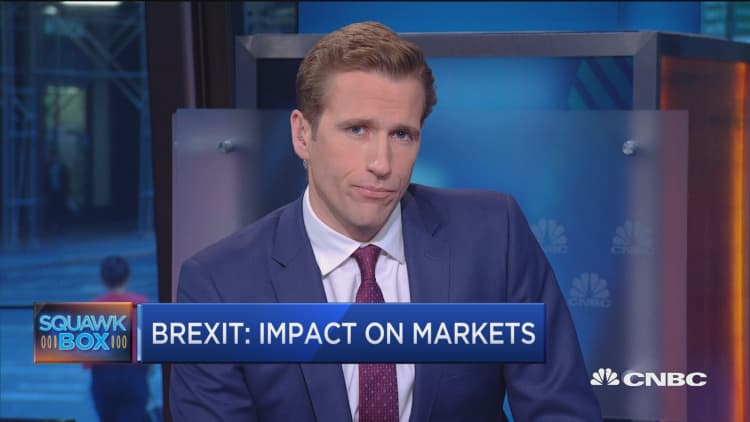
Markets have been complacent for too long about the possibility of a British exit from the European Union, but last week things began to change.
On Friday alone, the pound fell 1.5 percent from peak to trough off the back of a single poll, published in London's Independent, that gave "leave" a significant lead over "stay" (though most polls still show "stay" leading by a small margin). It highlighted how little a vote to "leave" is priced into markets.
Sterling
Shortly after last summer's U.K. general election, Sterling peaked at 1.58 against the U.S. dollar. The low point (1.385) over the year since was in late February after British Prime Minister David Cameron set the date for the E.U. referendum for June 23. So it is true to say that Sterling at least has been reacting to Brexit news, though it has been remarkably resilient since February.
A poll of polls from the Financial Times now puts the exit camp ahead, at 46 percent "leave" to 44 percent "stay." Betting markets, on the other hand, imply a one in three chance of an exit. Where Sterling would end up on June 24 in the event of an exit is hard to pinpoint, but there is widespread agreement it would lead to a major fall. UBS Wealth Management forecasts a fall to 1.25 against the dollar if Britain votes to leave. With that in mind, Sterling being above 1.40 with just 10 days to go until an incredibly close race suggests complacency.
UK stocks
The FTSE 100 has been even more resilient, reacting far less to Brexit news than the pound. However, the FTSE 250, which is made up of the next 250 biggest companies after the first 100 — thus smaller companies with higher U.K. exposure — has underperformed the FTSE 100 over the last year. The FTSE 100 has higher non-Brexit related revenues in international and commodity markets, but it would certainly be affected in the instance of a "leave" vote, if by sentiment alone. UBS Wealth Management forecasts a 10 percent fall if Britain votes leave, with banks, insurance and real estate taking the biggest hits.
Non-UK assets
Beyond U.K. assets, Brexit worries have recently spurred some hedging and repositioning of assets. Sliding yields in the German bund have been blamed in part, at least, on Brexit worries. Gold has moved higher as investors have picked it up while they drop euros. Other currencies, such as the Swiss franc and Danish krone, have benefited as well. Nomura said in a note Monday that some investors are adding to net short positions in both the pound and the euro in an effort to hedge against risk.
But there's still much complacency built into continental European assets. The euro is still up 3.6 percent against the dollar this year, and 6.6 percent against the pound. This despite cutting interest rates while the U.S. and U.K. have kept them on hold. A Brexit vote would be very damaging for the rest of the E.U. as well as the U.K., albeit perhaps not quite so quickly.
Just last week, billionaire investor George Soros suggested that a Brexit could be the spark for a wider breakdown of the E.U. Meanwhile, bond investor Bill Gross told CNBC's "Power Lunch" on Friday, "If Brexit wins, then fear gets into the marketplace and positions in terms of expectations for growth — anemic as it is in euroland — become threatened."
The pound fell far less on Friday against the euro than it did against the dollar off the back of the Independent poll. The euro also fell 1.5 percent against the dollar in the last 48 hours of last week — as if investors are finally realizing what a Brexit would mean for the eurozone itself.
European stocks
Another area to watch going forward will be European equities. Goldman Sachs says that U.S. outflows from European equities have "coincided closely" with a shift in U.K. uncertainty. They add that after the FTSE 250, the French CAC stock index and the German DAX stock index are the most correlated with U.K. policy uncertainty.
The big number in the Goldman report was probably this: Sales exposure of the DAX to the U.K. is 9 percent, almost the same as to China, at 10 percent. Markets often talk about Chinese news affecting the German index, particularly the exporters like Siemens, BMW and Volkswagen. But as yet, not much has been seen in response to Brexit news. That may be due to change.
At the end of last week, markets saw various safe-haven assets perform well: German, Japanese and U.S. bonds, the U.S. dollar and gold. Given that the Dow finished the week in positive territory, the spark for the safe-haven trades was likely international events — Brexit worries first and foremost among them. With 10 days to go, markets can expect further support for such safe havens.



